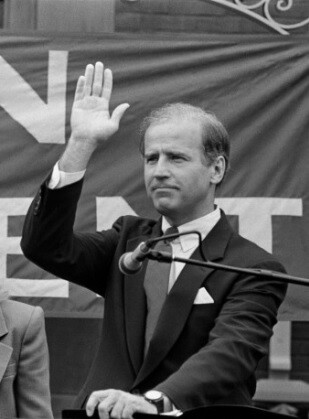Kim Dae-jung Library 1986-1987 during the Senate of Biden
Two letters sent to Chun Doo-hwan and the US Secretary of State were released.
Stopping the suppression of the straightforward constitution amendment and demanding the release of a prisoner of conscience
 Material photo” alt=”In 1987, Senator Joe Biden is declaring a candidate for the Democratic Party’s presidential election. <한겨레> Material photo” />
Material photo” alt=”In 1987, Senator Joe Biden is declaring a candidate for the Democratic Party’s presidential election. <한겨레> Material photo” />
In 1987, Senator Joe Biden is declaring a candidate for the Democratic Party’s presidential election. Material photo

A letter sent by Senator Joe Biden to President Chun Doo-hwan on February 20, 1986, along with seven fellow senators. Provided by Kim Dae-jung Library
The old letters sent by US President-elect Joe Biden to Chun and US Secretary of State George Schulz along with colleagues were released after 34 years, calling for an end to the crackdown of the Chun Doo-hwan regime’s democratization movement in the 1980s. One of the letters released by the Kim Dae-jung Library of Yonsei University on the 19th, one day before Biden’s inauguration as president, was Biden, then U.S. Senator John Kerry (former US Secretary of State) and Edward Kennedy (John F. Kennedy’s younger brother) and seven Democratic senators. This letter, addressed to the President of the Republic of Korea, Mr. Doo-Hwan Chun, expressed concerns over the Korean government’s repression of the 1986 presidential straight-line constitutional amendment movement. The lawmakers said, “I am writing to express my deep concern about the actions of the South Korean government to suppress the efforts of the recently launched Council for the Promotion of Democracy to petition for a constitutional amendment ahead of the 1988 presidential election.” I urge the government to adjust and reverse the policy.” At that time, the Chun Doo-hwan regime was increasing the intensity of repression against opposition leaders, such as seizing and searching the offices of the New Democratic Party and the Minchuhyeop, which started the straight-line constitutional amendment movement. The lawmakers criticized “No reasonable grounds were found for suppressing the public’s peaceful expression of opinions through petitions.” “The fact that it raises serious questions about the truthfulness of your government’s commitment to democratization.”

A letter sent to Secretary of State Schulz by 31 US senators, including Joe Biden, on November 20, 1987. Provided by Kim Dae-jung Library
The second letter, released on the day, was sent by Biden and other US senators to the then US Secretary of State Schulz on November 20, 1987. They expressed concern that “many political prisoners in Korea are being detained without committing any crimes,” and said, “They are victims of the government trying to suppress peaceful speech and associations.” The lawmakers cited Amnesty International and wrote that there were at least 40 detainees in Korea called “convicts of conscience,” and that they believed Korean sources said that there would be many more of the 900 political prisoners. The lawmakers wrote to the Chun Doo-Hwan regime that “I urge the release of all political prisoners who were improperly detained.” He also pointed out that many of the political prisoners were tortured by being forced to confess to be used as evidence against the court. They pointed out that South Korean prisoners of conscience were arrested on dubious charges of “threatening the well-being of the public” based on the National Security Law. In response, lawmakers attached a list of 38 South Korean prisoners of conscience and demanded that Schulz exert pressure so that the Chun Doo-hwan regime could release all political prisoners. The letter released that day did not include a list of 38 prisoners of conscience. The Kim Dae-jung Library disclosed this data and said, “Biden began to build friendships from the time Kim Dae-jung’s second exile in the US (December 1982 to February 1985). We expanded our mutual understanding,” he said. “If you look at Biden’s letter to President Chun Doo-hwan with his fellow senators in 1986, you can see that he was very interested in the reality of Korea at the time. The letters released this time are said to have been held by the Korean Human Rights Research Institute, organized by former President Kim Dae-jung during his exile. By Kim Ji-eun, staff reporter [email protected]
